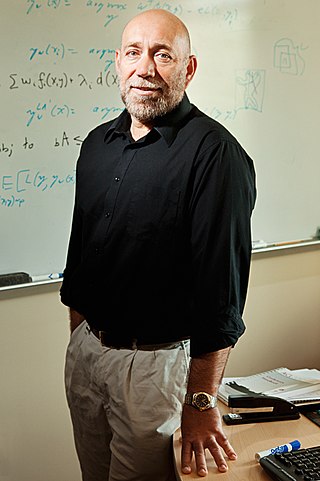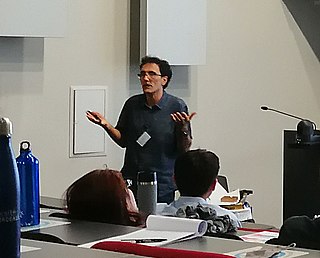A* is a graph traversal and pathfinding algorithm, which is used in many fields of computer science due to its completeness, optimality, and optimal efficiency. Given a weighted graph, a source node and a goal node, the algorithm finds the shortest path from source to goal.
A Bayesian network is a probabilistic graphical model that represents a set of variables and their conditional dependencies via a directed acyclic graph (DAG). While it is one of several forms of causal notation, causal networks are special cases of Bayesian networks. Bayesian networks are ideal for taking an event that occurred and predicting the likelihood that any one of several possible known causes was the contributing factor. For example, a Bayesian network could represent the probabilistic relationships between diseases and symptoms. Given symptoms, the network can be used to compute the probabilities of the presence of various diseases.

Allen Newell was an American researcher in computer science and cognitive psychology at the RAND Corporation and at Carnegie Mellon University's School of Computer Science, Tepper School of Business, and Department of Psychology. He contributed to the Information Processing Language (1956) and two of the earliest AI programs, the Logic Theorist (1956) and the General Problem Solver (1957). He was awarded the ACM's A.M. Turing Award along with Herbert A. Simon in 1975 for their contributions to artificial intelligence and the psychology of human cognition.

The Association for the Advancement of Artificial Intelligence (AAAI) is an international scientific society devoted to promote research in, and responsible use of, artificial intelligence. AAAI also aims to increase public understanding of artificial intelligence (AI), improve the teaching and training of AI practitioners, and provide guidance for research planners and funders concerning the importance and potential of current AI developments and future directions.

Judea Pearl is an Israeli-American computer scientist and philosopher, best known for championing the probabilistic approach to artificial intelligence and the development of Bayesian networks. He is also credited for developing a theory of causal and counterfactual inference based on structural models. In 2011, the Association for Computing Machinery (ACM) awarded Pearl with the Turing Award, the highest distinction in computer science, "for fundamental contributions to artificial intelligence through the development of a calculus for probabilistic and causal reasoning". He is the author of several books, including the technical Causality: Models, Reasoning and Inference, and The Book of Why, a book on causality aimed at the general public.

Trygve Magnus Haavelmo, born in Skedsmo, Norway, was an economist whose research interests centered on econometrics. He received the Nobel Memorial Prize in Economic Sciences in 1989.
Ramesh Chandra Jain is a scientist and entrepreneur in the field of information and computer science. He is a Bren Professor in Information & Computer Sciences, Donald Bren School of Information and Computer Sciences, University of California, Irvine.
Michael Paul Wellman is the Richard H. Orenstein Division Chair of Computer Science and Engineering and Lynn A. Conway Collegiate Professor of Computer Science and Engineering at the University of Michigan, Ann Arbor.

Manuela Maria Veloso is the Head of J.P. Morgan AI Research & Herbert A. Simon University Professor Emeritus in the School of Computer Science at Carnegie Mellon University, where she was previously Head of the Machine Learning Department. She served as president of Association for the Advancement of Artificial Intelligence (AAAI) until 2014, and the co-founder and a Past President of the RoboCup Federation. She is a fellow of AAAI, Institute of Electrical and Electronics Engineers (IEEE), American Association for the Advancement of Science (AAAS), and Association for Computing Machinery (ACM). She is an international expert in artificial intelligence and robotics.
Pierre Baldi is a distinguished professor of computer science at University of California Irvine and the director of its Institute for Genomics and Bioinformatics.

Eric Joel Horvitz is an American computer scientist, and Technical Fellow at Microsoft, where he serves as the company's first Chief Scientific Officer. He was previously the director of Microsoft Research Labs, including research centers in Redmond, WA, Cambridge, MA, New York, NY, Montreal, Canada, Cambridge, UK, and Bangalore, India.
Dragomir R. Radev was an American computer scientist who was a professor at Yale University, working on natural language processing and information retrieval. He also served as a University of Michigan computer science professor and Columbia University computer science adjunct professor, as well as a Member of the Advisory Board of Lawyaw.
David Leigh Waltz was a computer scientist who made significant contributions in several areas of artificial intelligence, including constraint satisfaction, case-based reasoning and the application of massively parallel computation to AI problems. He held positions in academia and industry and at the time of his death, was a professor of Computer Science at Columbia University where he directed the Center for Computational Learning Systems.
Anne Elizabeth Condon, is an Irish-Canadian computer scientist, professor, and former head of the Computer Science Department of the University of British Columbia. Her research focuses on computational complexity theory, DNA computing, and bioinformatics. She has also held the NSERC/General Motors Canada Chair for Women in Science and Engineering (CWSE) from 2004 to 2009, and has worked to improve the success of women in the sciences and engineering.

Barbara J. Grosz CorrFRSE is an American computer scientist and Higgins Professor of Natural Sciences at Harvard University. She has made seminal contributions to the fields of natural language processing and multi-agent systems. With Alison Simmons, she is co-founder of the Embedded EthiCS programme at Harvard, which embeds ethics lessons into computer science courses.

Francesca Rossi is an Italian computer scientist, currently working at the IBM Thomas J. Watson Research Center as an IBM Fellow and the IBM AI Ethics Global Leader.

Dan Roth is the Eduardo D. Glandt Distinguished Professor of Computer and Information Science at the University of Pennsylvania.

Carla Pedro Gomes is a Portuguese-American computer scientist and professor at Cornell University. She is the founding Director of the Institute for Computational Sustainability and is noted for her pioneering work in developing computational methods to address challenges in sustainability. She has conducted research in a variety of areas of artificial intelligence and computer science, including constraint reasoning, mathematical optimization, and randomization techniques for exact search methods, algorithm selection, multi-agent systems, and game theory. Her work in computational sustainability includes ecological conservation, rural resource mapping, and pattern recognition for material science.

Richard Eugene Neapolitan was an American scientist. Neapolitan is most well-known for his role in establishing the use of probability theory in artificial intelligence and in the development of the field Bayesian networks.

Diego Calvanese is an Italian computer scientist and professor at the faculty of computer science at the Free University of Bozen-Bolzano. In addition, since 2019, he is Wallenberg Visiting Professor at the department of computing science, Umeå University. He is well known for his scientific contributions in knowledge representation and reasoning in AI, description logics, and database theory.












